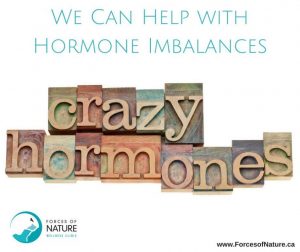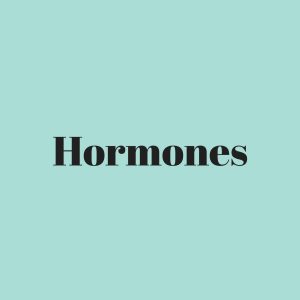
Hormones
What are hormones?
Hormones are chemicals that your body produces that are carried by your bloodstream to organs or tissues elsewhere in your body. They regulate how your body works and your behaviour. When we use the word hormone, we often refer to your reproductive hormones, although there are many other substances in your body that act as a hormone.
List of Hormones and their Actions
For the purpose of this article, we’ll limit our discussion to reproductive hormones. This list is not inclusive of hormones that do not directly impact the reproductive organs.
Estrogen
Estrogen stimulates the development of secondary sex characteristics in women, promotes the growth of the endometrium, myometrium, maintains the health of the skin and bones, and has neuroprotective functions. In men, estradiol modulates libido, helps with erectile function and sperm production
Progesterone
Progesterone enhances sodium excretion, prepares the endometrium for implantation, decreases the maternal immune response, decreases uterine contractility, activates the milk-producing function of the breasts, influences skin health, antispasmodic, anti-inflammatory, enhances the function of serotonin receptors in the brain, moderate cravings by moderating the effects of dopamine
Testosterone
Testosterone promotes protein synthesis, increases muscle mass, bone density/growth/maturation, maturation of sex organs, development of secondary male sex characteristics, libido, sperm production
DHEAs
In your brain DHEAs promotes neuroprotection, neurite growth, neurogenesis and neuronal survival, apoptosis, catecholamine synthesis and secretion, as well as having antioxidant, anti-inflammatory and anti-glucocorticoid effects
Androstenedione
Androstenedione is a weak androgen and an intermediate in the production of testosterone and estrone.
DHT/Dihydrotestosterone
Dihydrotestosterone has an essential role in the development of the male external genitalia & is the primary androgen in the prostate, seminal vesicles, skin & hair follicles. Excess DHT can cause male androgenic alopecia & is involved in BPH & prostate cancer. It may also be involved in female androgenic alopecia, acne, hirsutism & seborrhea.
Prolactin
Prolactin has anti-stress effects, stimulates milk production, and suppresses fertility.
LH
LH surges to cause ovulation, promotes progesterone production after ovulation, stimulates testosterone release in males
FSH
FSH stimulates egg follicle growth and rise in estrogen in women, and influences sperm development in men.
GnRH
GnRH is made by your hypothalamus and controls the release of LH and FSH.
Oxytocin
Oxytocin is produced by your hypothalamus and released by your pituitary, regulates maternal behaviour and social attachment.
What are the hormone-producing glands?
For the reproductive hormones mentioned above, the organs that produce them are the ovaries, testes, pituitary, adrenal glands, and hypothalamus. Fat tissue can also produce estrogen.
The Pituitary
- The “Master” gland
- The size of a pea, attached to the base of the brain by a thin stalk
- Situated just below the hypothalamus which is the communication centre for the pituitary
- Hormones produced: ADH, Oxytocin, TSH, ACTH, Prolactin, MSH, GH, FSH, LH
The Adrenal Glands
- Situated atop your kidneys
- Responsible for blood pressure, fluid & electrolyte balance, regulation of metabolism & blood glucose, immune regulation/suppression, production of androgens & stress response
- Hormones produced: Aldosterone, cortisol (hydrocortisone), cortisone, corticosterone, DHEA, DHEAs, androstenedione, small amounts of estrogen & progesterone
The Ovaries
- Situated beside your uterus
- After puberty and until menopause, they are responsible for developing egg follicles into eggs, releasing the hormones estrogen and progesterone and ovulating (releasing an egg each month)
- Hormones produced: estradiol, testosterone, progesterone, DHT
The Testes
- Produce sperm & androgens, primarily testosterone
- Hormones produced: testosterone, DHT, estradiol
Signs and symptoms of hormone imbalance in women
Because hormones impact so many different systems in your body, there are many signs of hormone imbalance. The symptoms depend on the hormone and whether it is too high or too low. Here is a table by hormone of the symptoms of hormone imbalance in women:
Signs of Hormone Imbalance in Women
| Hormone | Signs of Excess in Women | Signs of Deficiency in Women |
|---|---|---|
| Testosterone | Hirsutism, amenorrhoea, acne, hair loss, genital abnormalities, depression, deeper voice, infertility | Depression, low libido, low muscle mass, low energy/drive or motivation |
| DHEAs | Hirsutism, amenorrhoea, acne, hair loss, genital abnormalities, depression, deeper voice, infertility | Fatigue, depression, anxiety, hypersensitivity to noise, loss of libido, dry eyes, skin, and hair, loss of head hair, axial (armpit) hair & pubic hair |
| DHT | Hirsutism, amenorrhoea, acne, hair loss, genital abnormalities, depression, deeper voice | Depression, low libido, low muscle mass, low energy/drive or motivation |
| Estradiol | Heavy periods, acne, clots in menstrual flow, breast tenderness, depression, highly emotional, endometriosis, PMS migraines, fibroids | Vaginal dryness, UTI’s, irregular periods, hot flashes, h/a or migraines, irritability, mood swings, depression, cognitive decline |
| Progesterone | Low libido, depression, anxiety, mood swings, weight gain, UTIs, fatigue, muscle weakness, fibroids, stomach upset, edema, hives | Anxiety, waking at night, endometriosis, hot flashes, dysmenorrhea, fibrocystic breasts, PMS, bone loss, low libido, infertility |
| Prolactin | Irregular periods, vaginal dryness, nipple discharge, acne, hirsutism, decreased estrogen, depression, anxiety, hostility, memory deficit, psychosis | Fatigue, loss of pubic and underarm hair, and inability to produce breast milk (alactogenesis) |
| Oxytocin | Emotional hypersensitivity & hyper-reactivity to the emotions of others | Poor communication, irritability and inability to feel affectionate, more anxiety, difficulty achieving orgasm, sugar cravings, lack of joy, disturbed sleep, muscle aches |
Signs and symptoms of hormonal imbalance in men
Here is a table by hormone of the symptoms of hormone imbalance in men. The table displays both signs of an excess of the hormone and deficiency of the hormone.
Signs and Symptoms of Hormone Imbalance in Men
| Hormone | Signs of Excess in Men | Signs of Deficiency in Men |
|---|---|---|
| Testosterone | Acne or oily skin, prostate enlargement, worsening of sleep apnea, hypogonadism, increase in RBC’s, hair loss, infertility | Depression, erectile dysfunction, low energy, low muscle mass, low libido |
| DHEAs | Usually asymptomatic, but may result in estrogen excess | Fatigue, depression, anxiety, hypersensitivity to noise, loss of libido, dry eyes, skin, and hair, loss of head hair, axial (armpit) hair, and pubic hair |
| DHT | Prostate cancer, male pattern baldness, aggression, acne | Depression, irritability, low libido, lethargy, low muscle mass, increase in body fat |
| Estradiol | Prostate cancer, BPH, heart disease, depression, gynecomastia, low libido, low muscle mass | Low bone density, low libido, erectile dysfunction, increase in abdominal fat, low sperm count |
| Progesterone | Prostate cancer, BPH, heart disease, depression, gynecomastia, low libido, low muscle mass | Depression, low bone density, low libido, increased abdominal fat |
| Prolactin | Erectile dysfunction, gynecomastia, low body hair, low libido, decreased testosterone, retrograde orgasm, depression, anxiety, hostility, memory deficit, psychosis | Unknown |
| Oxytocin | Emotional hypersensitivity & hyper-reactivity to the emotions of others | Poor communication, irritability and inability to feel affectionate, more anxiety, difficulty achieving orgasm, sugar cravings, lack of joy, disturbed sleep, muscle aches |
Testing for Hormones
At Forces of Nature, our naturopathic doctor orders blood tests for each of the above tests. Saliva testing can also be done to determine whether hormones are passing into the tissues. Comprehensive DUTCH testing for hormones and hormone metabolites can also be done.
How to Balance Hormones Naturally
Naturopathic treatment for hormonal imbalance involves first identifying the exact hormonal imbalance. This may require testing all of the above hormones to determine the exact cause of hormone problems. Natural therapies that may help balance hormones include changes to your diet, exercise, stress reduction, herbal medicine, acupuncture, and Traditional Chinese Medicine.
Contact us for more information about how we can help you achieve optimal hormone balance at 416-481-0222 or email Maria@ForcesofNature.ca
Authored by Dr. Pamela Frank, Naturopathic Doctor, updated Feb 11, 2022
